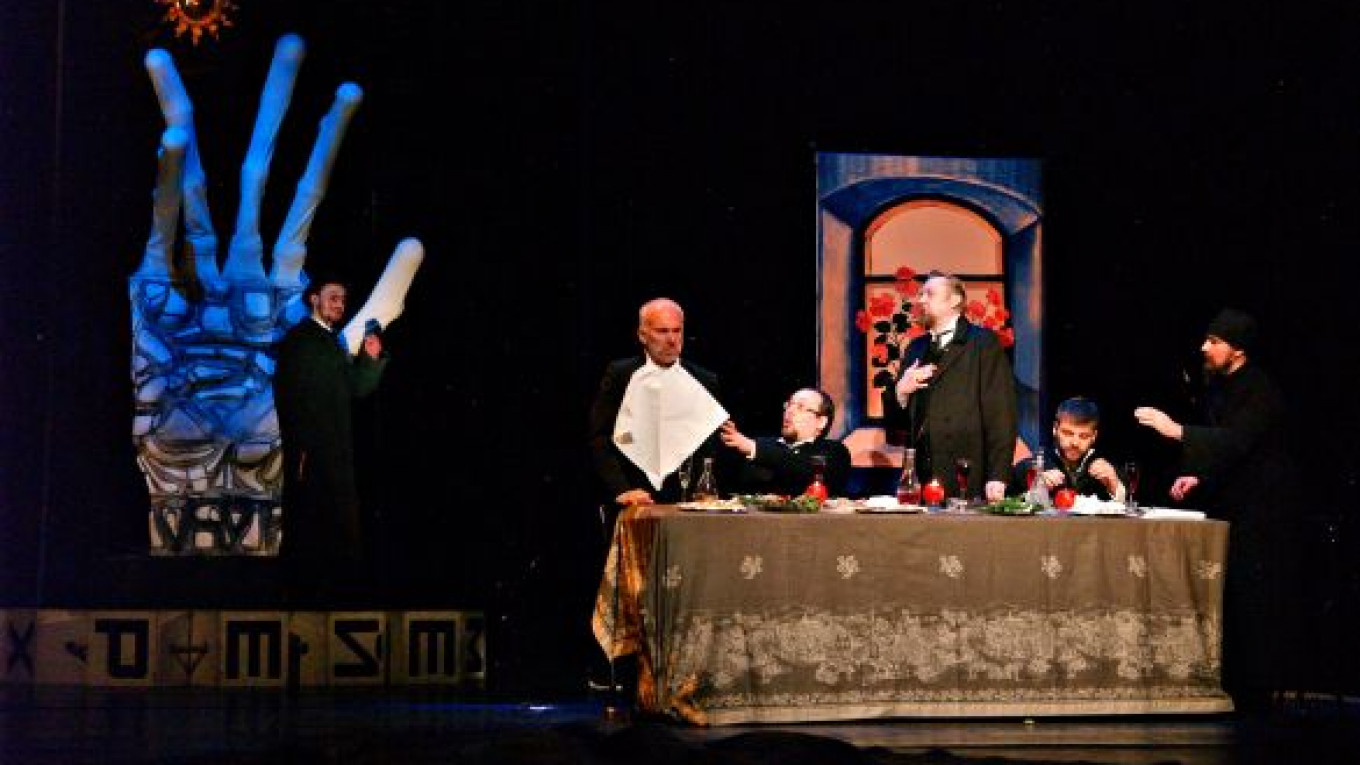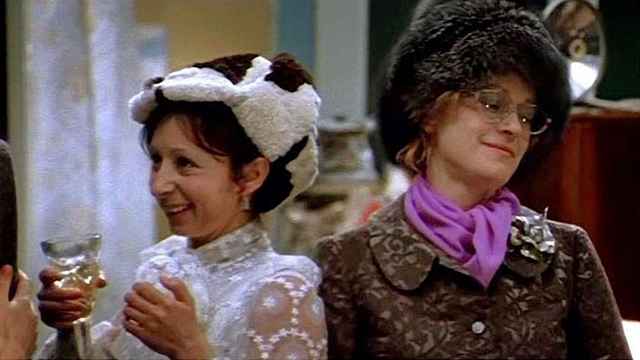Yury Lyubimov's latest production at the Taganka Theater may well be his last.
Lyubimov, who founded the Taganka in 1964, resigned last week as the house's artistic director over a running conflict with his troupe triggered by an altercation during a tour to the Czech Republic in June.
If the mercurial director's decision stands, fate will decree that his baffling production of "Mask and Soul" will stand as his final artistic statement at the Taganka.
"Mask and Soul" takes its title from a book of memoirs by Fyodor Chaliapin, although the presence of Anton Chekhov in the work is greater. A figure representing Chekhov (Andrei Smirennov) stalks the stage from beginning to end, and most of the spoken texts are drawn from various writings by Chekhov. Also included are excerpts from Byron's dramatic poem "Cain."
Lyubimov's trademark episodic style is very much in evidence. Scenes seemingly having nothing to do with one another run one after another. Two men in a train car discuss the nature of fame; a peasant is tried for killing his wife; Chekhov reminisces about women in Siberia and Japan; a grumpy old teacher insists on attending a school dinner despite the fact that no one really wants to see him; Cain and Abel fall into strife.
Occasionally these scenes are linked by a chorus riding out on a platform and singing or speaking text to music composed by Lyubimov's longtime collaborator Vladimir Martynov. The music is often monotone, shrill and dark, consisting at times of single chords separated into rhythmic segments.
There are a whopping 50 characters, ranging from Chekhov, Ivan Bunin and Zinaida Gippius, to Adam, Eve, priests, judges, secret policemen, a host of literary characters and a so-called Exalted Idiot.
The physical appearance of the performance, devised by Lyubimov, employs a handful of common objects — a table and chairs or seats in a train — and a few esoteric symbols. A large hand with working fingers stands at center stage and is something of a jungle gym on which actors can climb, sit and hang. A sunburst mirror hangs behind and above the hand, and the back wall appears to have dimly reflective properties.
Is the hand the hand of God? Of fate? Is it a symbol of what individuals use to make what they will of their lives?
What all of this adds up to is debatable, although there are inklings of at least two through lines.
"Mask and Soul" is shot-through with a weary aversion to the common ways of men and women. People know not what they do or even think. Worse yet, they appear not to care. The few who do care are either misguided or looked upon by others as irritants and crazies.
To a certain extent this show could also be called "Vanity Fair." Most of its characters stand as illustrations of Chekhov's own declaration that all he wanted to do with his literature "was to say honestly to people: 'Have a look at yourselves and see how bad and dreary your lives are!'"
There is another aspect that emerges, however, when you back away from the specifics of this production. That is Lyubimov's own take on his own life and legacy.
How can we not see his echo in the grumpy old school teacher who has been around too long, but keeps pushing himself forward despite his illnesses, and about whom his colleagues carp behind his back while praising him to the heavens to his face. The connection between the teacher (played with caustic prickliness by Alexei Grabbe) and Lyubimov is made perfectly clear when one character speaks of the teacher's many pupils and the lights in the house are brought up to illuminate the spectators sitting in the hall.
Could the Cain and Abel segments represent the conflicts that broke the Taganka into two warring factions in the early 1990s and have again attacked it now? Might the discussion about fame between a construction engineer and a distinguished professor reflect ironically on Lyubimov's own attitude to his fame?
As ciphers to biography and history, this is definitely of interest. As theater, however, I found "Mask and Soul" one of Lyubimov's weakest productions in recent years.
Perhaps this is because, as the director claims, he cannot connect with his actors anymore. Perhaps at the age of 93 he is finding it harder to connect with his own muse. In the end, just one more mystery to add to the legend of Yury Lyubimov and the Taganka Theater.
"Mask and Soul" (Maska i Dusha) plays July 15 at 7 p.m. at the Taganka Theater. 76/21 Zemlyanoi Val. Metro Taganskaya. Tel. 915-1217. Running time: 2 hours.
A Message from The Moscow Times:
Dear readers,
We are facing unprecedented challenges. Russia's Prosecutor General's Office has designated The Moscow Times as an "undesirable" organization, criminalizing our work and putting our staff at risk of prosecution. This follows our earlier unjust labeling as a "foreign agent."
These actions are direct attempts to silence independent journalism in Russia. The authorities claim our work "discredits the decisions of the Russian leadership." We see things differently: we strive to provide accurate, unbiased reporting on Russia.
We, the journalists of The Moscow Times, refuse to be silenced. But to continue our work, we need your help.
Your support, no matter how small, makes a world of difference. If you can, please support us monthly starting from just $2. It's quick to set up, and every contribution makes a significant impact.
By supporting The Moscow Times, you're defending open, independent journalism in the face of repression. Thank you for standing with us.
Remind me later.







